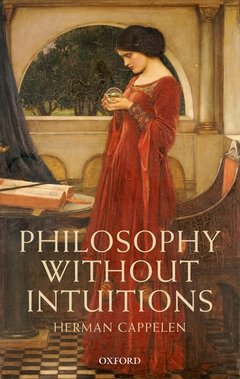Philosophy without Intuitions
Langue : Anglais
Auteur : Cappelen Herman

The claim that contemporary analytic philosophers rely extensively on intuitions as evidence is almost universally accepted in current meta-philosophical debates and it figures prominently in our self-understanding as analytic philosophers. No matter what area you happen to work in and what views you happen to hold in those areas, you are likely to think that philosophizing requires constructing cases and making intuitive judgments about those cases. This assumption also underlines the entire experimental philosophy movement: only if philosophers rely on intuitions as evidence are data about non-philosophers' intuitions of any interest to us. Our alleged reliance on the intuitive makes many philosophers who don't work on meta-philosophy concerned about their own discipline: they are unsure what intuitions are and whether they can carry the evidential weight we allegedly assign to them. The goal of this book is to argue that this concern is unwarranted since the claim is false: it is not true that philosophers rely extensively (or even a little bit) on intuitions as evidence. At worst, analytic philosophers are guilty of engaging in somewhat irresponsible use of 'intuition'-vocabulary. While this irresponsibility has had little effect on first order philosophy, it has fundamentally misled meta-philosophers: it has encouraged meta-philosophical pseudo-problems and misleading pictures of what philosophy is.
Preface and Acknowledgements. 1. Intuitions in Philosophy: overview and taxonomy. Part I: The Argument from 'Intuition'-Talk. Introduction to part I. 2. 'Intuitive', 'intuitively', 'intuition', and 'seem' in English. 3. Philosophers' use of 'intuitive' (I): A defective practice?. 4. Philosophers' use of 'intuitive' (II): Some strategies for charitable interpretation. 5. Philosophers' use of 'intuitive' (III): Against the explaining away of intuitions. Part II: The Argument from Philosophical Practice. Introduction to part II. 6. Centrality and Philosophical Practice. 7. Diagnostics for intuitiveness. 8. Case studies: Ten philosophical thought experiments. 9. Lessons Learned, replies to objections, and comparison to Williamson. 10. Conceptual analysis and intuition. 11. A big mistake: Experimental philosophy. Bibliography. Index.
Herman Cappelen is a professor of philosophy at the University of St Andrews, where he works at the Arché Philosophical Research Centre. He works in philosophy of language, philosophical methodology and related areas of epistemology, metaphysics, and philosophy of mind. He is the author of many papers and three books: Insensitive Semantics (with Ernest Lepore), Language Turned on Itself (with Ernest Lepore), and Relativism and Monadic Truth (with John Hawthorne).
Date de parution : 03-2012
Ouvrage de 256 p.
14.6x22.2 cm
© 2024 LAVOISIER S.A.S.



